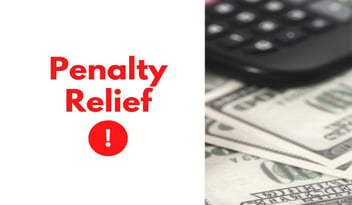When I hear commercials on TV or on the radio that promise specific results to people in Charlotte who owe money to the IRS, it really bothers me.
One of the most pervasive advertising schemes you’ll hear repeated over and over again is about only paying “pennies on the dollar” to the IRS.
The reason this one rubs me the wrong way in particular is quite simple: It doesn’t exist.
If you’ve heard this program referenced and have been curious about it, it’s time to set the record straight for all my curious friends in Concord.
The Truth About “Pennies On The Dollar”
What exactly does “pennies on the dollar” refer to? It’s a reference to the old IRS Offer in Compromise program. Basically this program allows eligible tax debtors to pay the IRS an amount of money that is less than what they owe in order to wipe out their entire tax debt.
In some advertising, you’ll hear companies talk about settling for 20%, 10%, or even less of what is owed to the IRS. These ads, and the tele-sales people, are trying to sell you an Offer in Compromise service package. Many of their websites even have little interactive calculators where you type in how much you owe the IRS, and they’ll spit out a “You may only have to pay $$$” message.
Unfortunately, these ads and online calculators are pure fiction.
Several years ago, the IRS identified the phrase “pennies on the dollar” as a form of deceptive advertising. They explicitly instruct licensed practitioners that the use of this phrase violates Circular 230 (the tax pro rules that we have to abide by when representing you to the IRS).
However, since the IRS doesn’t have jurisdiction over many of the marketing companies advertising these services, it comes under the jurisdiction of the Federal Trade Commission (FTC) to look out for them. Unfortunately, given the volume of other issues they have to deal with including identity theft and con artist scams, the FTC is stretched pretty thin and rarely has the resources to chase down these fraudsters. In fact, they haven’t taken significant action against these “pennies on the dollars” scams in nearly a decade.
If you see these websites, Facebook ads, TV commercials, or radio ads, here’s what you need to know: There’s absolutely no provision in the tax code that allows you to offer a set percentage of your tax debt as payment. It has never existed.
Here’s the reality: The amount of your Offer in Compromise settlement is calculated using a very strict formula, and it’s NOT a secret — it’s available as a worksheet in IRS Publication 656-B.
Additionally, the IRS provides an online Offer in Compromise Pre-Qualifier Tool on their website to help you determine eligibility.
Based on the IRS formula, if you have equity in assets exceeding your tax debt amount, you probably don’t qualify for an Offer in Compromise.
For most Charlotte individuals, the common thing holding up your Offer in Compromise (OIC) eligibility is going to be the equity in your home. Less commonly, it could be the equity in your rental properties, equity in a collection of classic cars, stamps, coins, guns, art, etc.
If the value of ANY of those assets is greater than your tax debt, you don’t qualify for the OIC program on financial grounds.
In the same vein, if you’re a high income earner in Concord, it’s highly unlikely you’ll qualify for the OIC program. The reason for this is the IRS only allows certain amounts of money every month as “eligible expenses” for housing, car payments, food, etc. If your lifestyle exceeds these amounts, the IRS doesn’t care — they’ll only allow you to claim the limits they set.
Any monthly income you have over those IRS-defined limits gets multiplied by either 12 or 24, depending on how long you plan to take to pay off your OIC. For example, if you have $3,000 per month left over after the IRS eligible expenses are taken into consideration, and you intend to pay the IRS within 5 months of them accepting your OIC application, then you multiply the $3,000 by 12, which is $36,000. If you owe the IRS less than this amount, then you don’t qualify for an OIC.
In these circumstances, you may qualify for a period of up to 12 months to make a “lifestyle adjustment,” and reduce your living expenses to come into line with those IRS expense limits. This will often involve selling luxury homes and getting rid of toys such as cars and boats. Keep in mind that these items are all covered by your tax lien, so any proceeds from the sale of these items technically is owned by the IRS and should be paid over to them. A good tax representative in Charlotte can assist you with structuring these sales so that both you and the IRS get something out of it.
Beware of anybody promising that your tax debt can be settled for some fixed percentage of the debt. That’s not the way it works and never has. Anybody trying to sell you on that idea is selling you beachfront property in Kansas, and you should seek assistance elsewhere.
We’d be more than happy to take a look at your situation and identify whether you’re eligible for the OIC program. If you’re not, then we can help with other resolution programs you may be eligible for.
If you’re ready to put your tax debt behind you, we’d be happy to help you with that. Let’s chat:
https://calendly.com/saragonzalez
We’re in your corner…
Warmly,
Sara Gonzalez



